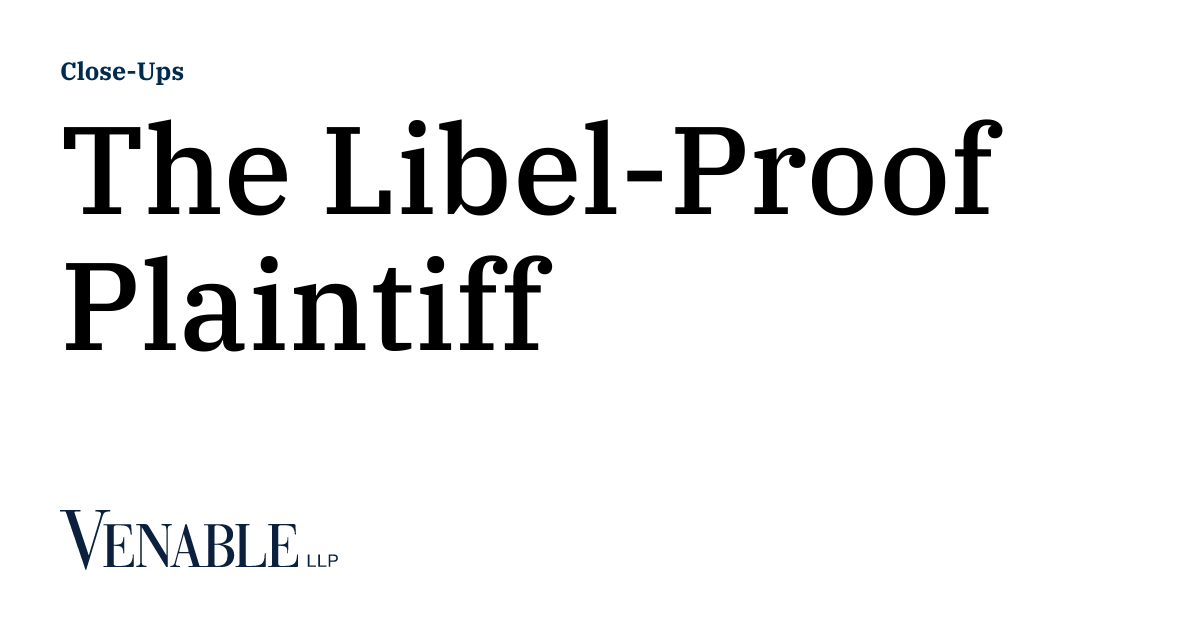Who can’t recover for defamation even though they may have been libeled?
The libel-proof plaintiff.
The “libel-proof plaintiff” doctrine provides an independent ground for dismissing a defamation cause of action on the basis that a person with a widespread reputation for bad or dishonest behavior may not recover. Often defendants will raise this doctrine when moving to dismiss a complaint or moving for summary judgment. The underlying rationale for the application of the libel-proof plaintiff doctrine across federal and state courts to a plaintiff with a well-known “sullied reputation” is that an alleged defamatory statement pertaining to a plaintiff’s reputation, or crimes, cannot further harm such a plaintiff’s already-damaged reputation.
So how does a plaintiff become “libel-proof”?
Federal and state courts, including but not limited to those in California and New York, have applied the libel-proof plaintiff doctrine to bar defamation suits brought by plaintiffs with notorious reputations, reasoning that allegedly defamatory statements could not cause further harm to their already sullied reputations in the community. See Robert D. Sack, Sack on Defamation, §10:5.5 [B] (5th ed, 2017).
The libel-proof plaintiff doctrine has been applied to bar defamation claims from plaintiffs with publicized bad conduct, such as those with prior criminal convictions. For example, in Cardillo, the Second Circuit held that, as a matter of law, a plaintiff who had challenged published statements in a book describing his numerous specific crimes was “libel-proof,” namely because of his status as a habitual criminal. See Cardillo v. Doubleday & Co., 518 F.2d 638 (2d Cir. 1975).
In Cardillo, a former government witness, Vincent Teresa, wrote a book titled My Life in the Mafia in 1973. In his book, Teresa wrote about Cardillo, a convicted felon with whom Teresa said he became associated with at the time of Cardillo’s rise to power in organized crime. The court considered Cardillo’s criminal convictions and sentence of 21 years for various federal felonies, which included crimes similar to those Teresa accused him of committing in his book. The court held that Cardillo was “unlikely by virtue of his life as a habitual criminal to be able to recover anything other than nominal damages” for the statements at issue. Id. at 639.
Likewise, in California, the Central District Court applied the libel-proof plaintiff doctrine to bar recovery for a plaintiff found to be an “individual who engage[d] in certain anti-social or criminal behavior and suffer[ed] a diminished reputation.” Plaintiff Henry Wynberg had a 14-month relationship with Elizabeth Taylor that generated “at least 86 news articles.” Wynberg v. National Enquirer, Inc., 564 F. Supp. 924, 925 (C.D. Cal. 1982). As a result, the National Enquirer published a story reporting that Wynberg was allegedly using his relationship with Elizabeth Taylor to obtain money from her. Wynberg then sued the National Enquirer for libel. However, the court considered Wynberg’s past conduct and criminal convictions to determine that he was a person with such a bad reputation that it rendered him “libel-proof” under the circumstances. The court explained that “[d]epending upon the nature of the conduct, the number of offenses, and the degree and range of publicity received, there comes a time when the individual’s reputation for specific conduct, or his general reputation for honesty and fair dealing is sufficiently low in the public’s estimation” that a plaintiff may be libel-proof as a matter of law. Id. at 928.
Ultimately, a court considering whether to dismiss a libel claim pursuant to the libel-proof plaintiff doctrine will consider the plaintiff’s reputation in the community, whether the alleged defamatory statements pertain to the bad conduct that the plaintiff has previously undertaken, and how much publicity the plaintiff’s bad conduct has received.
How has the libel-proof plaintiff doctrine recently been applied?
A recent federal case out of the Northern District of Florida is a good example of the use of the libel-proof plaintiff doctrine. On May 6, 2025, Magistrate Judge Martin A. Fitzpatrick of the Northern District of Florida issued a recommendation (the Report) that a defamation plaintiff’s claim be dismissed for failure to state a claim. Report at 1. One of the magistrate’s reasons for dismissal was that the plaintiff was “libel-proof,” and therefore, the plaintiff was barred at the pleading stage from asserting a defamation claim. Id. at 22–23.
In Da’vhon Young vs. WCTV News Channel, Case No. 4:24cv161-MW-MAF, a prisoner sued local news station WCTV News, alleging that WCTV broadcast a false story identifying him in a mug shot as “a main suspect in a highly publicized violent crime that took place at” a university.
WCTV acknowledged that it “erroneously published” the plaintiff’s mug shot in connection with the story. The plaintiff sued for defamation notwithstanding WCTV’s correction, and WCTV moved to dismiss the complaint.
The plaintiff had a 20-year criminal history, including convictions for lewd or lascivious battery against a child, kidnapping, possession of a firearm by a convicted felon, and failure to register as a sexual offender, and, by the time of the story in question, he had been accused of a different premeditated murder. The magistrate had no problem finding that the plaintiff was libel-proof. In turn, the magistrate concluded that he “could not have suffered any additional harm because his reputation in the community was already so tarnished before the publication that no further harm could have occurred.” Id. at 22.
How does the libel-proof plaintiff doctrine affect future defamation actions?
A defendant seeking to defend against a defamation action should consider whether the plaintiff is “libel-proof,” as courts are willing to dismiss claims on that basis, even at the pleading stage. The rationale is simple: The very point of defamation law is to guard against harm to a person’s reputation and good name. Thus, a person with a poor reputation and without a good name has nothing for the law of defamation to protect.
















Leave a Reply